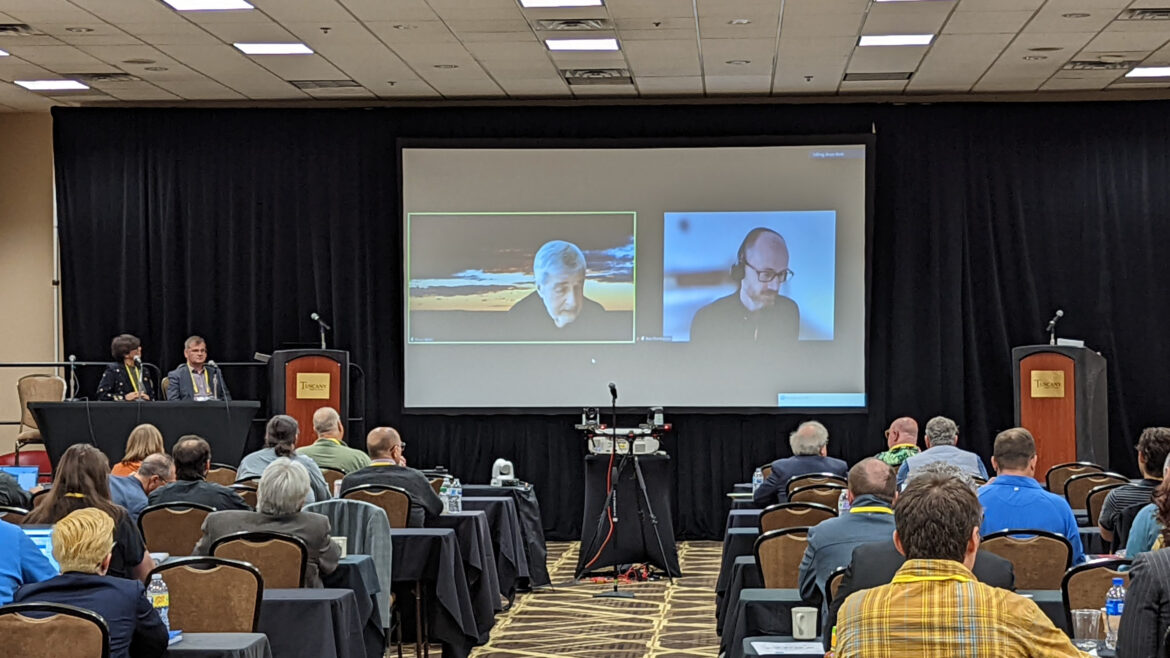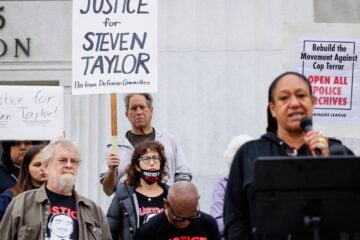Radio engineers’ conference returns in conjunction with spring NAB Show

Scott Fybush
Remote presenters, including former NPR engineer Bruce Wahl, are part of the mix at the hybrid 2022 Public Radio Engineering Conference in Las Vegas.
Three years after the Association of Public Radio Engineers last gathered for an in-person convention, it reconvened the Public Radio Engineering Conference Thursday in Las Vegas with a mixture of on-site and remote attendees and presenters.
The event, traditionally held just before the opening of the NAB Show in Las Vegas, had been fully planned before the onset of the COVID pandemic abruptly canceled in-person events and travel in April 2020.
“We had no idea when we were going to be able to recover,” said convention organizer and APRE past president Jobie Sprinkle. After the NAB again canceled plans for an April 2021 convention, APRE followed suit, then faced a dilemma when the NAB began planning a fall 2021 show.
“As a small organization, we could not pull off a fall one of these and then turn around and do one in spring, too, so we decided it was much better to wait and do it properly,” Sprinkle said.
The pandemic ended up dooming NAB’s 2021 plans, giving APRE time to pull together a full 2022 conference. Many registrants from 2020 allowed APRE to keep their money, easing some of the financial pain of the pandemic. By the time the conference opened, Sprinkle said it had 115 full registrants, a larger number than at its last conference in 2019 and even more than had registered in 2020.
With the pandemic still ongoing, APRE’s board was acutely aware that many engineers were either unable or unwilling to travel to Las Vegas. While previous PREC events had been streamed, APRE wanted to make this year’s conference more inclusive for off-site attendees.
“How do you do it in a way that both the audience in the room is engaged, and the people online feel like they’re a part of it, too?” Sprinkle said. Late into Wednesday night, the engineering team from Optimized Media Group and St. Cloud State University’s KVSC in Minnesota was tweaking a production that includes multiple live cameras and a platform to allow remote attendees to ask questions and enter door-prize drawings. Adding to the challenge, several PREC presenters were also virtual, appearing on a large screen at the front of the conference room.
“Here we are, a bunch of radio guys doing a lot of video work here, and pulling it off,” Sprinkle said.
About 20% of attendees this year are virtual, paying the same fee for the conference as those attending in person. While APRE wants to continue to make PREC accessible to members who can’t get to Las Vegas, Sprinkle hopes more engineers will take advantage of the connections, camaraderie and hallway moments that come only from in-person interaction.
“We’ve all been in a bunch of Zooms,” he said. “You get a lot of information that way, but nothing like the kinds of things you learn here, just standing in the hallway. Talking among three or four engineers and somebody mentions something, and you suddenly come away with a nugget that you would not have gotten any other way.”
APRE is also looking closely at a potential engineering shortage as older engineers continue to retire without suitable replacements in line to succeed them. Veteran PREC organizer Paxton Durham knows the problem firsthand; a week after this year’s conference, he’s stepping down after decades as chief engineer at WVTF/Radio IQ in Virginia. To help encourage new engineers to join public radio, APRE and the Public Radio Satellite System offered scholarships to the event, bringing more than a dozen mostly younger engineers to Las Vegas with airfare, hotel and conference registration paid for.
“It’s getting them hooked on the job,” Sprinkle said — and introducing them to mentors who can help build their public radio careers. This year’s scholarship group is a hybrid, too, including several recipients who had been picked for 2020 and others who are new for this year.
The agenda for this year’s two-day PREC is heavily digital, focusing on some of the new technologies allowing broadcasters to augment their audio content with enhanced content distributed over HD Radio and IP connections. Session topics also include new ways to caption live broadcasts for better accessibility and innovations in the delivery of metadata such as album art and show topics to car radio screens.
There are more traditional engineering topics on the menu as well, including new FM antenna technology and the use of single-frequency networks to improve FM signal coverage in terrain-challenged areas.
PREC will conclude with its annual awards dinner Friday night. Rich Parker, director of engineering for CoastAlaska public broadcasting and an early leader of APRE, will receive the group’s engineering award to honor his long history of involvement with the organization and at public stations including WHYY in Philadelphia and Vermont Public Radio.







